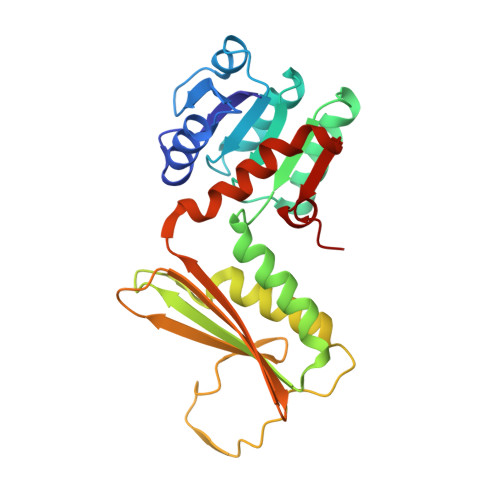The structure of dihydrodipicolinate reductase (DapB) from Mycobacterium tuberculosis in three crystal forms.
Janowski, R., Kefala, G., Weiss, M.S.(2010) Acta Crystallogr D Biol Crystallogr 66: 61-72
- PubMed: 20057050
- DOI: https://doi.org/10.1107/S0907444909043960
- Primary Citation of Related Structures:
1YL5, 1YL6, 1YL7 - PubMed Abstract:
Dihydrodipicolinate reductase (DHDPR, DapB) is an enzyme that belongs to the L-lysine biosynthetic pathway. DHDPR reduces the alpha,beta-unsaturated cyclic imine 2,3-dihydrodipicolinic acid to yield the compound 2,3,4,5-tetrahydrodipicolinic acid in a pyridine nucleotide-dependent reaction. The substrate of this reaction is the unstable product of the preceding enzyme dihydrodipicolinate synthase (DHDPS, DapA). Here, the structure of apo-DHDPR from Mycobacterium tuberculosis is reported in two orthorhombic crystal forms, as well as the structure of DHDPR from M. tuberculosis in complex with NADH in a monoclinic crystal form. A comparison of the results with previously solved structures of this enzyme shows that DHDPR undergoes a major conformational change upon binding of its cofactor. This conformational change can be interpreted as one of the low-frequency normal modes of the structure.
- EMBL Hamburg Outstation, c/o DESY, Notkestrasse 85, D-22603 Hamburg, Germany.
Organizational Affiliation:


















